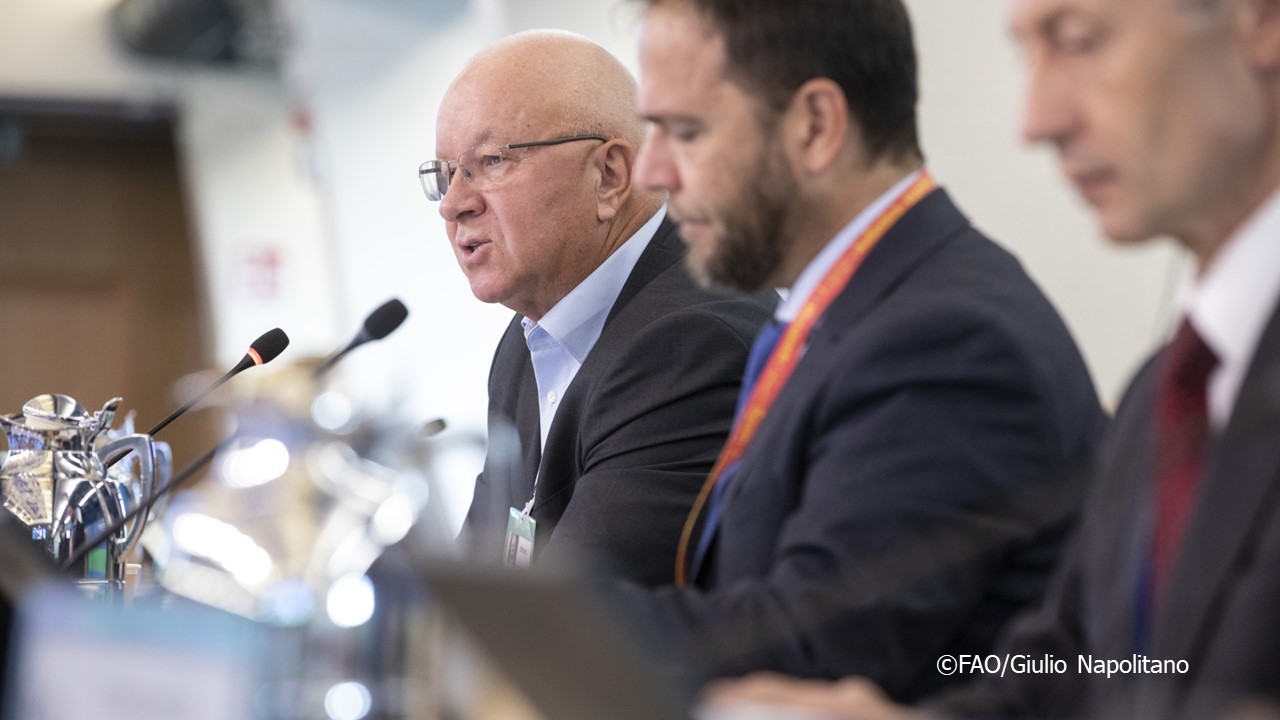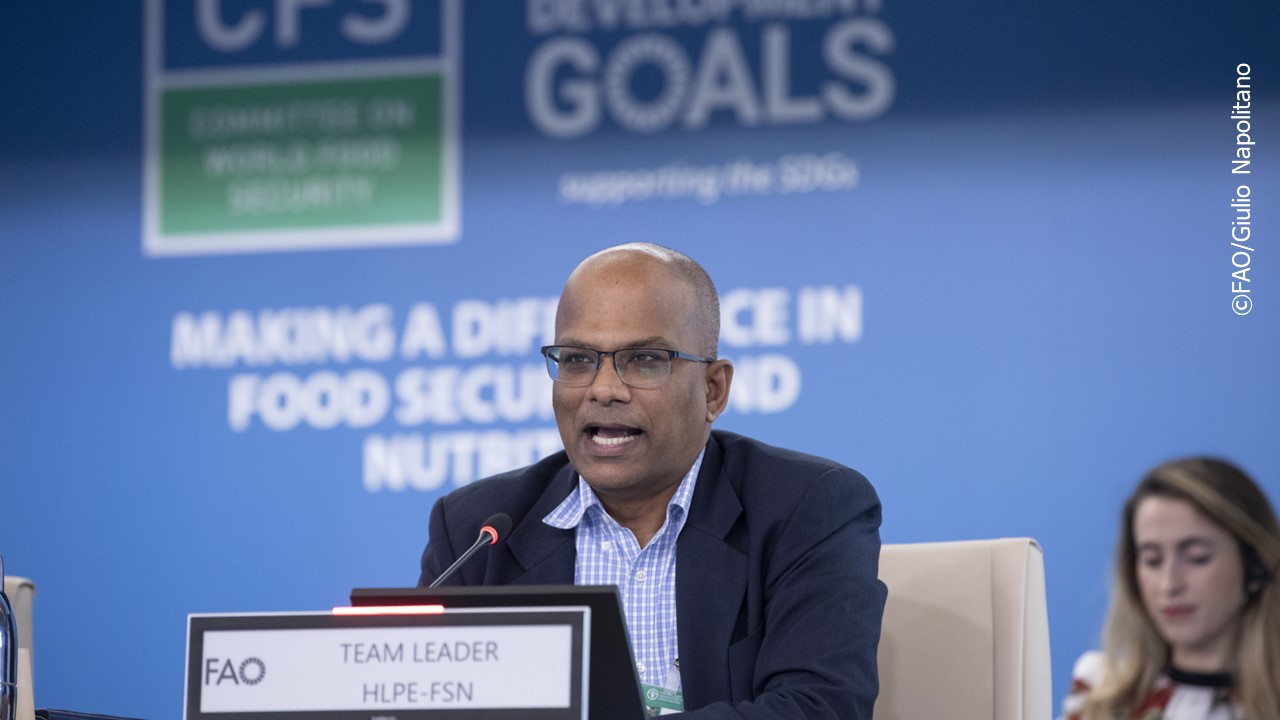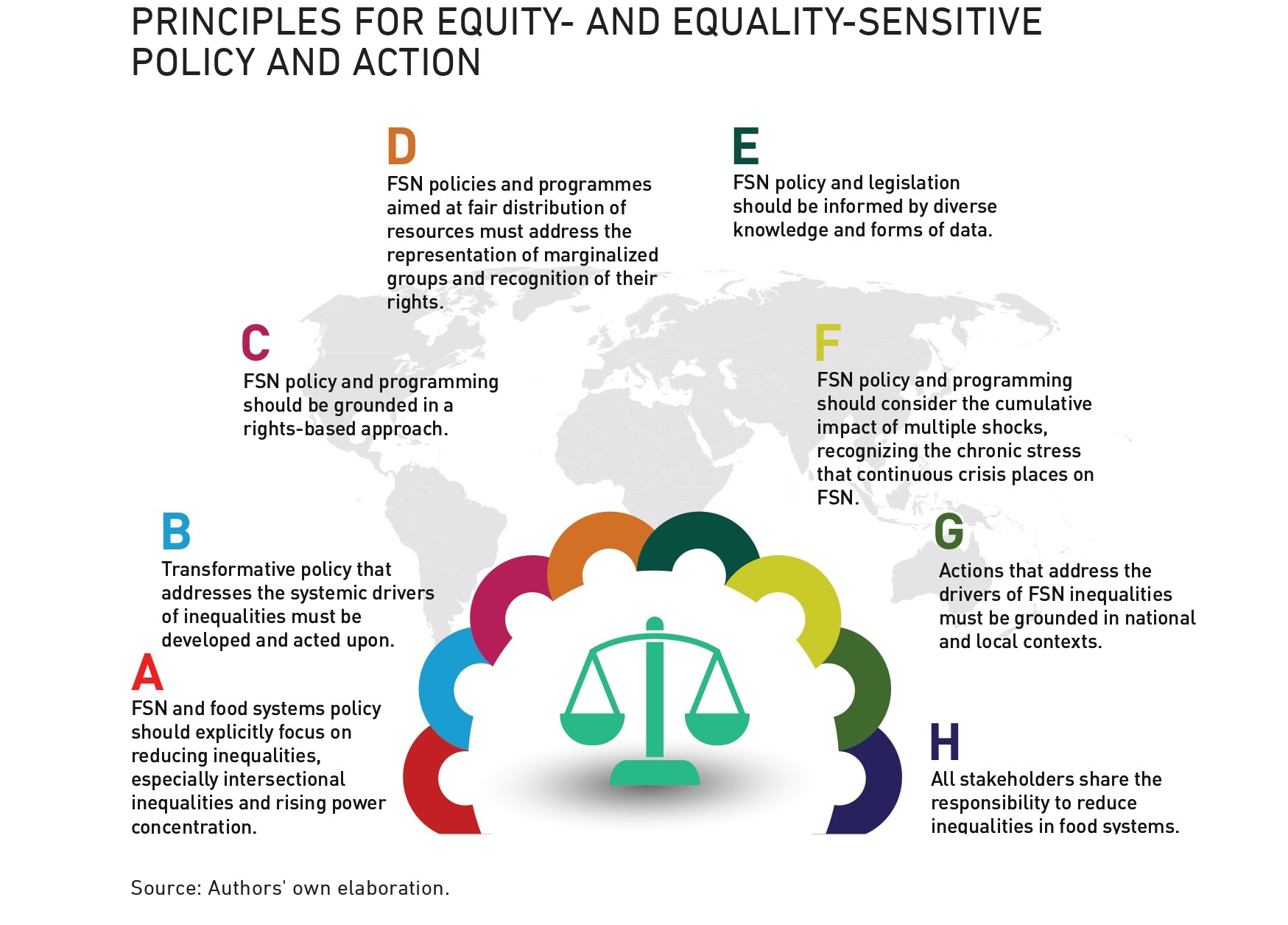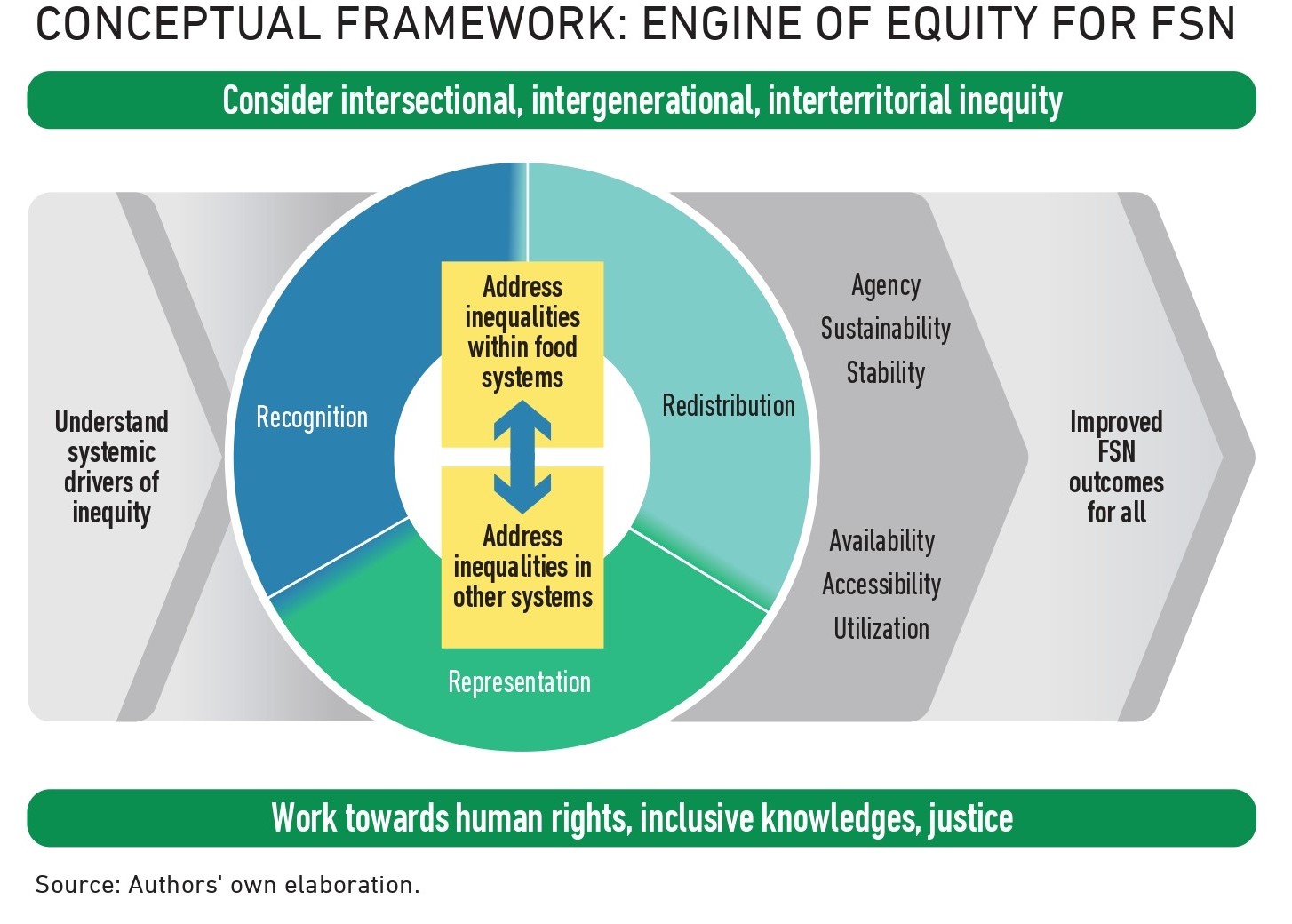
Fifty-first plenary session of the Committee on World Food Security (CFS 51), taking place from 23 to 27 October 2023 in a hybrid format in Rome, Italy.
©FAO/Giulio Napolitano
In recent years, food security and nutrition have risen to the forefront of global discussions, capturing the attention of political figures and policymakers worldwide. In the face of emerging conflicts, a worldwide pandemic, climate change and many more global food crises, the agreed goal of ending hunger, food insecurity and malnutrition in all its forms by 2030 could remain out of reach. In this context, the Committee of World Food Security (CFS) stands as a vital platform to promote collaboration, innovation, policy development and coherence for improved food security and nutrition (FSN) for all.
CFS is the foremost inclusive platform for all stakeholders to which the core mandate revolves on ensuring that FSN become attainable realities for all. Employing an inclusive, and participatory decision-making process, CFS involves governments, civil society movements, the private sector, and international organizations. CFS assumes the responsibility of formulating and endorsing policy recommendations and guidance on an extensive array of topics directly related to food security and nutrition. To ensure legitimacy in the proposed policy recommendations and guidelines, CFS develops these building on scientific and evidence-based reports produced by the High Level Panel of Experts on Food Security and Nutrition (HLPE-FSN).
Specifically, the HLPE-FSN provides an independent, comprehensive and evidence-based analysis through a scientific transparent and inclusive process on subjects that are mandated by the Multi-Year Programme of Work (MYPoW) of CFS.
To fulfil this important mission, CFS holds an ordinary Plenary session every year in October, gathering all CFS members to discuss the most pressing issues, engage in dialogue, and make decisions regarding proposed guidelines, among other topics. This year, the first part of the CFS 51st Plenary, that occurred from 23 October to 27 October 2023, served as a catalyst for crucial discussions regarding the following agenda items:
As the science-policy interface of CFS, the HLPE-FSN members actively engaged in the CFS 51st Plenary week. Bernard Lehmann, the HLPE-FSN Chairperson at the time, Bhavani Shankar, the HLPE-FSN team leader of the 18th report, Nicholas Nisbett, a member of the drafting team for the 18th report, and Jane Battersby, the team leader for the 19th report, all took part in the week’s events.

First, Bernard Lehmann participated in the high-level opening ceremony of the Plenary where he reiterated to all CFS stakeholders the importance of the HLPE-FSN. In his keynote address, he began by emphasizing the importance of taking bold actions to achieve SDG2 by 2030: “it is not too late to wipe out hunger by 2030. If decision-makers around the world act together, the goal of ending hunger can still be achieved” he asserted. Moreover, Lehmann stressed the vital role of the global scientific community in shaping food security and nutrition policymaking, underlining the need for evidence-based decision-making. His message directed to policymakers can be summarized as an urge to embrace and act upon the advice and policy recommendations put forth by scientific bodies. He also highlighted the pivotal role of the HLPE-FSN in CFS and on the world stage to this specific role, describing it as the primary independent and scientific institution dedicated to food security and nutrition. “Our working processes ensure legitimacy among stakeholders and guarantee a high degree of scientific quality” Lehmann said.
Exemplifying the pivotal role played by the HLPE-FSN was Bhavani Shankar, who delivered a comprehensive presentation on the findings of the HLPE-FSN 18th report entitled “Reducing inequalities for food security and nutrition”, with a special emphasis on the policy recommendations that emerged from the report.

Setting the stage, Professor Shankar began by presenting the conceptual framework developed in this report, describing how inequalities in FSN outcomes are best reduced by addressing disparities in food systems and in other related systems. Shankar emphasized that sustainable change requires understanding and addressing the systemic drivers and root causes of inequity: "we must address the deep-rooted, systemic drivers to have a meaningful, lasting impact on reducing inequalities. We cannot simply apply surface-level solutions or quick fixes; we must treat the entire system," Bhavani stated.
To achieve this, actions must operate through processes of recognition, representation, and redistribution, with human rights and principles of justice at the core of these efforts to tackle inequalities in FSN outcomes.
Moreover, Bhavani Shankar presented the principles for action and the recommendations of the report. He explained that there are eight sets of principles that should be taken into consideration when designing a policy or programme in this area. These include a human rights-based approach as the foundation, addressing systemic drivers, centring efforts on reducing inequality, considering the three pillars (recognition, representation and redistribution), leveraging diverse forms of knowledge, accounting for context and potential shocks, and adapting drivers to the specific circumstances.

"It's not a one-size-fits-all approach; we must always consider the context-specific factors when designing policy programmes aimed at reducing inequalities. Let us also not overlook the significance of three essential pillars and guiding principles for action, and our foremost priority should be reaching out to those who are farthest behind” Professor Shankar reminded all delegates during the event.
The report provides further a set of recommendations for different groups involved in FSN-related policymaking, research and action, including governments, international organizations, the private sector, civil society and research institutions. The set of recommendations can be found here.
To conclude his presentation, Bhavani Shankar sent a strong message to CFS members: "we realize that implementing these recommendations is challenging, some of these recommendations can be controversial, but we do feel that it is important in order to achieve real and meaningful progress in the battle towards reducing inequalities for an improved food security and nutrition for all".
This presentation then led to very interesting discussions among CFS members, many with supporting statements to the report’s findings. Bernard Lehman ended the session by a call for action from the stakeholders: “Scientists analyse and try to offer their insights in a very transparent manner; the debate lies in your hands”.
Furthermore, the HLPE-FSN participated in two side events.
The first one, titled “Mobilizing Urban Youth in Climate Change Adaptation Solutions in Africa”, focused on the transformation of the urban agenda with a particular emphasis on mobilizing and empowering the youth, who represent the future of these cities.
Bernard Lehmann, in the opening session, emphasized the interconnected nature of urban issues with other HLPE-FSN report topics, including the use of data and inequalities. Jane Battersby's keynote presentation highlighted the critical role of youth in achieving food system transformation, emphasizing the need for their increased representation in the decision-making process: “We should view youth as necessary agents of change”. Jane Battersby presented the draft results of the upcoming HLPE-FSN report on “Strengthening urban and peri-urban food systems to achieve food security and nutrition in the context of urbanization and rural transformation”.
She highlighted that “the forthcoming report of HLPE-FSN explores the vital role of citizens, and how to develop their 'agency,' as the sixth dimension of food security”. Battersby ended her presentation by showcasing various examples of youth-led projects and initiatives in the urban context of Cape Town.
The second side event, titled “Nourishing progress – reflecting on a decade of social protection innovations and thinking for zero hunger”, focused on exploring the evolving thinking and approaches regarding social protection's role in FSN and food systems transformation. Through a panel discussion that featured Nicholas Nisbett, the event synthesized emerging evidence and ideas from the past decade, building on the findings of the HLPE-FSN 4th report on social protection for food security.
“Social protection systems can have positive impacts in addressing inequalities in access to food, income, and other resources. The evidence in this area is improving and social protection systems are now widely accepted to be a key part of a broader preventive or redistributive approach to multidimensional poverty,” Nisbett stressed during this event.
He then presented an interesting set of questions related to:

These questions were an example of how the engine of equity, the framework of the HLPE-FSN 18th report, can be used to guide the development and evaluation of social protection programmes to ensure they are equitable and effective
Finally, an important outcome of the CFS 51st Plenary was the endorsement of the next Multi-Year Programme of Work (the MYPoW), in which the HLPE-FSN is mandated by CFS to develop the following reports in the years ahead:
As the CFS 51st Plenary session was adjourned, the final conclusions are yet to come. During this session, significant discussions were held, and critical issues were brought to the forefront, all of which will be further deliberated in the upcoming session.
Read more about the fifty-first plenary session of the Committee on World Food Security
Watch the webcast of the session